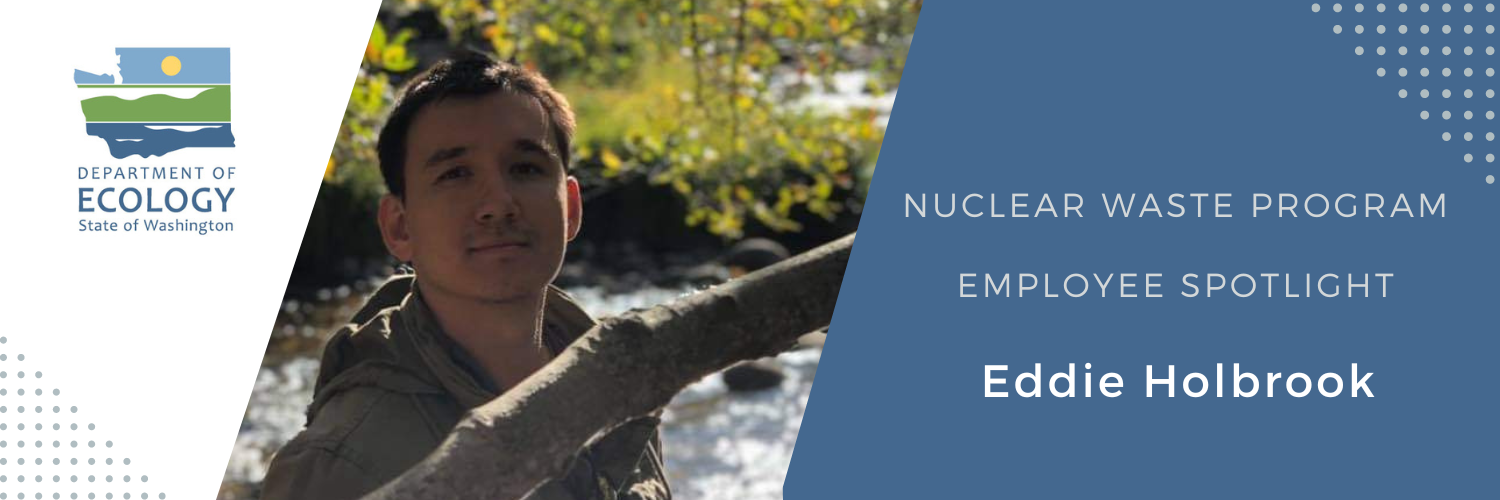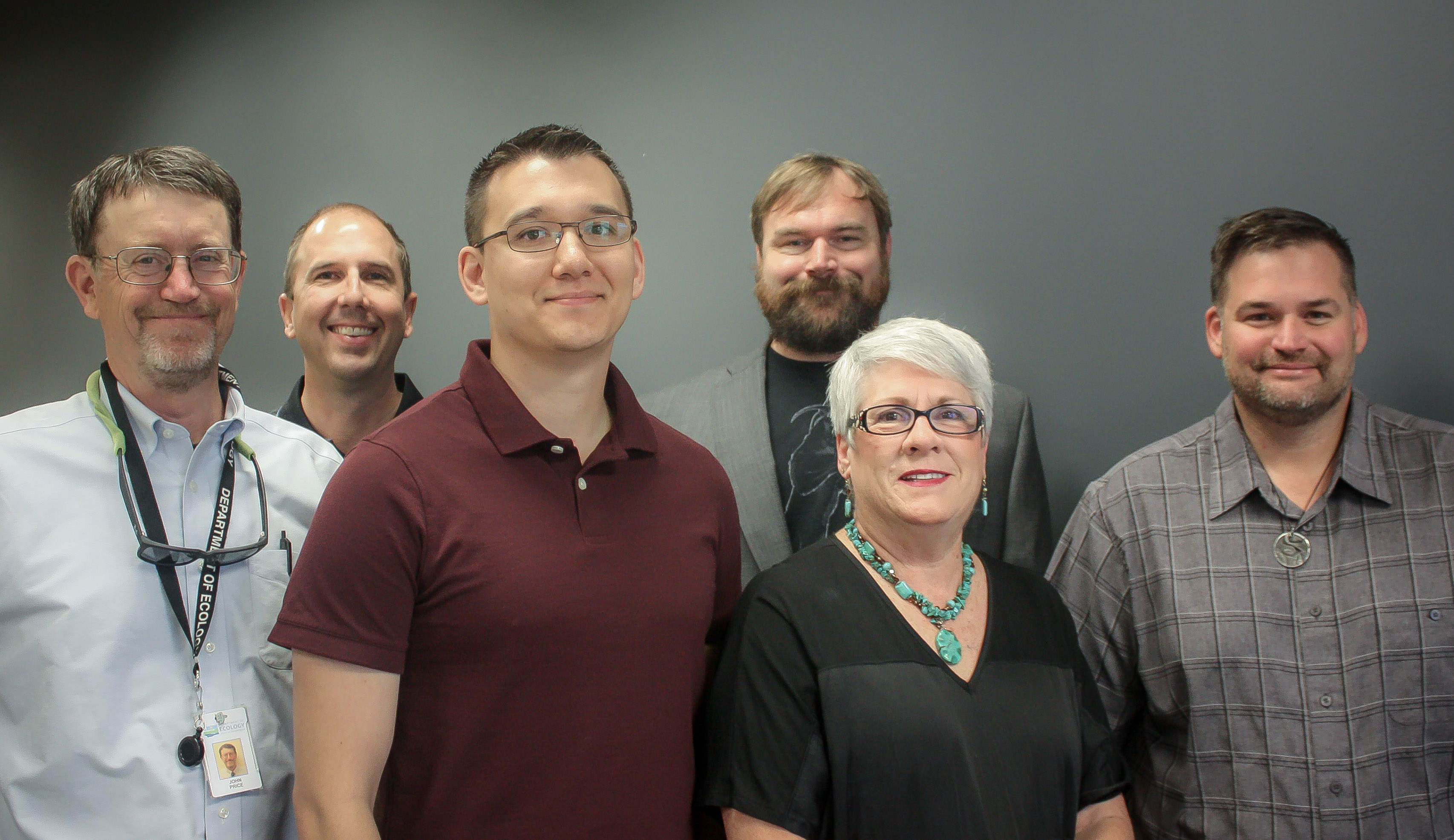In this edition of our Behind the Scenes at the Nuclear Waste Program series, we sat down with Eddie Holbrook, our Waste Management Section Manager.
More than waste management
Eddie’s total time at Ecology is 7 years.
His work at Ecology began as an inspector with the Compliance and Regulatory Assistance Section of the program. In that role, Eddie primarily supported compliance work as it related to Comprehensive Environmental Response, Compensation, and Liability Act (CERCLA) and dangerous waste activities.
“I enjoyed this role as it afforded me the opportunity to see just about every facility on the Hanford Site and facilities we oversaw across the state,” Eddie said.
Currently, in his role as a manager in the Waste Management Section, he’s been able to experience a lot of the critical work beyond that previous role.
“I chose to apply for this position because of its unique responsibilities and the growth I hope to have in my second time with Ecology,” he said.
The following are just some of the components of Eddie’s work that he enjoys:
- Hanford Site air quality permitting and compliance
- Hanford Site water quality (wastewater) permitting and compliance
- Dangerous waste permitting on the Hanford Site, Puget Sound Naval Shipyard and Intermediate Maintenance Facility, and Perma-Fix Northwest
- Supporting the Washington Energy Facility Site Evaluation Council’s oversight of the Columbia Generating Station, which is the only commercial nuclear reactor in Washington
- CERCLA cleanup
A challenge for Eddie is having to switch gears between multiple disciplines and somehow ensuring the coordinated effort is managed as efficiently as possible to progress the clean up mission.
“Any given facility can require multiple permits from different regulatory requirements,” Eddie said.
Eddie and current Deputy Program Manager Stephanie Schleif at the Waste Encapsulation and Storage Facility.
A day in the life
Eddie is an avid gym-goer and likes to start his day at 4 a.m. to make sure he can get in a workout before tackling nuclear waste.
“By the time I start my day at work at 8 a.m., I’m either reviewing the daily plans of waste management section staff, preparing my own daily plan, or kicking off with a meeting,” he said.
As section manager, it’s not unusual that he spends the majority of his day supporting staff requests regarding general administrative responsibilities or permitting responsibilities (review letters, modifications, escalation of issues, and more).
“I’ve spent a lot of time in the last year recruiting, developing and training staff in an effort to rebuild the team," Eddie said. "Now that I have a low enough vacancy rate, I’ve been turning my focus to the team’s direct alignment in both permitting and compliance activities we’re obligated to complete.”
Making a career in waste management
In 2010, Eddie started a career in hazardous material and waste management, shortly after graduating from The Evergreen State College.
Eddie’s initial plans were to follow a career path in sustainable development and infrastructure related to leadership in energy and environmental design. However, the field was difficult to break into at the time.
So, instead, Eddie took a leap of faith, taking his first hazardous material and waste management job with Chenega Global Services. This position entailed supporting U.S. Department of Defense operations in South Korea.
“Little did I know at the time that I would continue this line of work for the next 13 years,” Eddie said.
Michelle Ortiz and Eddie Holbrook at the REACH museum at an outreach event in 2022.
After his tenure at Chenega, Eddie ventured into state work for the Department of Ecology, followed by an exciting opportunity at Tesla. After several years and gaining valuable experience, Eddie decided to come back to Ecology.
He said one of the highlights of his work at Ecology has been seeing the legacy and history that accompanies our mission to restore and protect the environment and human health.
Eddie recalls the opportunity to step aboard one of the world’s smallest and most secretive nuclear submarines (NR-1) as it was being scrapped at the Puget Sound Naval Shipyard.
“Knowing that I would be one of the last to see what was left of a unique piece of history, as I inspected mixed waste satellite accumulation areas to ensure compliance was incredible,” he said.
In addition to his main role at NWP, Eddie has also taken the time to help our communications team at outreach events within the community.
Family, Teslas and Capoeira!
Family is an important part of Eddie’s life. He and his wife enjoy the opportunities they have to share with their nieces and nephews. They often spend time with them sharing their adventures both locally and around the world.
His time at Tesla, and in Korea working in operations, helped him become a better regulator at Ecology.
“During my time leading hazardous waste management operations for Tesla at Giga Factory 1, we spent some time learning how to dismantle and scrap Tesla vehicles and other products that just about everyone else in the factory was trying to put together,” Eddie said.
Experiencing the challenges organizations face in integrating regulatory requirements into their day-to-day operations, has helped him provide effective oversight as a manager.
While at Tesla, Eddie managed hazardous waste, non-hazardous waste, and universal waste. He also led emergency response for numerous types of incidents, but primarily those involving hazardous materials and waste. It's a 24/7 operation that led the ramp up for Tesla Model 3 and Model Y battery packs, to include home and commercial energy storage products.
In his spare time, when he is not deeply involved in waste management issues, Eddie enjoys the practice of Capoeira.
Capoeira is an Afro-Brazilian martial art that combines elements of dance, acrobatics, music and spirituality. It is performed to the accompaniment of call-and-response choral singing and percussive instrumental music.
“My wife introduced me to Capoeira about 10 years ago and I’ve enjoyed meeting with and sharing this practice with Capoeiristas anywhere we go,” Eddie said.
Ample opportunity for future generations
Eddie encourages future generations to give waste management a try. It might not be for everyone, but it sure provides tremendous opportunities.
“Hazardous waste management might not be your dream career, but it can take you to some unique and interesting places around the world,” said Eddie.
Eddie enjoys the work he has been doing and is looking forward to what the future holds.
“Both of my times at Ecology have led to some of the greatest growth in my career,” Eddie said.
“There are very few jobs like this one that will expose you to a broad scope of experiences and knowledge. I look forward to continuing to grow and learn in this role.”
Eddie and the rest of NWP's Compliance Team in 2018.
About our Nuclear Waste Program team
This blog is the third in our series highlighting our amazing team overseeing the federal government’s cleanup of the Hanford Site — one of the most contaminated nuclear cleanup sites in the world.
In each blog we spotlight an individual member of our Nuclear Waste Program and the work they do to keep Hanford cleanup on track.





